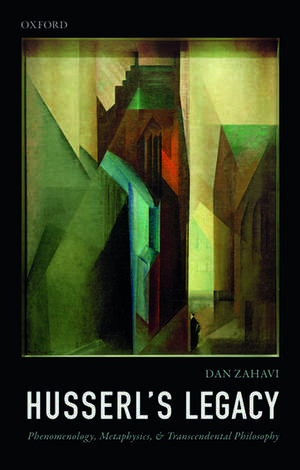Husserl's Legacy: Phenomenology, Metaphysics, and Transcendental Philosophy
Autor Dan Zahavien Limba Engleză Paperback – 21 noi 2019
| Toate formatele și edițiile | Preț | Express |
|---|---|---|
| Paperback (1) | 178.22 lei 10-16 zile | |
| OUP OXFORD – 21 noi 2019 | 178.22 lei 10-16 zile | |
| Hardback (1) | 326.50 lei 31-37 zile | |
| OUP OXFORD – 14 dec 2017 | 326.50 lei 31-37 zile |
Preț: 178.22 lei
Preț vechi: 195.44 lei
-9% Nou
Puncte Express: 267
Preț estimativ în valută:
34.10€ • 37.16$ • 28.74£
34.10€ • 37.16$ • 28.74£
Carte disponibilă
Livrare economică 22-28 martie
Preluare comenzi: 021 569.72.76
Specificații
ISBN-13: 9780198852179
ISBN-10: 0198852177
Pagini: 256
Dimensiuni: 140 x 215 x 14 mm
Greutate: 0.32 kg
Editura: OUP OXFORD
Colecția OUP Oxford
Locul publicării:Oxford, United Kingdom
ISBN-10: 0198852177
Pagini: 256
Dimensiuni: 140 x 215 x 14 mm
Greutate: 0.32 kg
Editura: OUP OXFORD
Colecția OUP Oxford
Locul publicării:Oxford, United Kingdom
Recenzii
Dan Zahavi's latest book on Husserl has many merits. Not only does it offer a clear, sharp, and detailed reconstruction of the Husserlian phenomenological project, but it also stands out for its ambitious aim of highlighting the usefulness of a sound reading of historical texts to address theoretical questions....Zahavi's reconstruction of Husserl's philosophy succeeds in showing not only the complexity and richness of Husserl's project, but also the philosophical viability and relevance of his transcendental approach
...all of the advantages of Zahavi's excellent readings of Husserl and the positions he takes in Husserl's Legacy regarding the continued importance and relevance of phenomenology are preserved in this account. And for those readings and positions-with their exceptional clarity and importance-we are indebted and grateful.
Over the past twenty-five years, Dan Zahavi has established himself as a foremost interpreter of Edmund Husserl's phenomenology and a leading contributor to the development of contemporary phenomenology. He is renowned for showing that phenomenology is a viable and valuable alternative for addressing contemporary controversies in the philosophy of mind, the cognitive sciences, and social ontology and epistemology. Both facets of his work are on display in Husserl's Legacy.
Clear, well-informed, and persuasive.
Zahavi's latest book, Husserl's Legacy, is a major achievement
Dan Zahavi has written an observant and sympathetic account of Husserl's philosophy viewed in a contemporary context.
...all of the advantages of Zahavi's excellent readings of Husserl and the positions he takes in Husserl's Legacy regarding the continued importance and relevance of phenomenology are preserved in this account. And for those readings and positions-with their exceptional clarity and importance-we are indebted and grateful.
Over the past twenty-five years, Dan Zahavi has established himself as a foremost interpreter of Edmund Husserl's phenomenology and a leading contributor to the development of contemporary phenomenology. He is renowned for showing that phenomenology is a viable and valuable alternative for addressing contemporary controversies in the philosophy of mind, the cognitive sciences, and social ontology and epistemology. Both facets of his work are on display in Husserl's Legacy.
Clear, well-informed, and persuasive.
Zahavi's latest book, Husserl's Legacy, is a major achievement
Dan Zahavi has written an observant and sympathetic account of Husserl's philosophy viewed in a contemporary context.
Notă biografică
Dan Zahavi is Professor of Philosophy and Director of the Center for Subjectivity Research at the University of Copenhagen. He is author and editor of more than 25 volumes including Husserl's Phenomenology (Stanford 2003), Subjectivity and Selfhood (MIT Press 2005), The Phenomenological Mind (with Shaun Gallagher, Routledge 2008/2012), and most recently Self and Other (OUP 2014). His work has been translated into more than 25 languages. He is co-editor in chief of the journal Phenomenology and the Cognitive Sciences, and recently edited The Oxford Handbook of Contemporary Phenomenology (OUP 2012).
